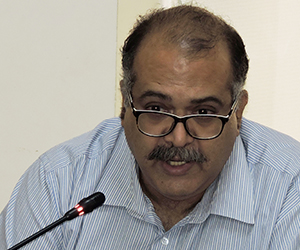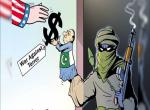A perusal of the US embassy cables made public by Wikileaks makes it clear that while the US has all the information and intelligence about the double-game being played by Pakistan, it finds itself clueless, even helpless, in bringing to an end this double game. A large part of the problem lies in the fact that the US is trying to achieve far too many, often competing, objectives – usher in democracy in Afghanistan, capacity building of the Afghan state (but without getting involved in nation building), protect human rights and women rights in Afghanistan, prevent Pakistan from getting destabilised, eliminate the Islamist radical groups and their networks, in particular the Al Qaeda, ensure security of Pakistan's nuclear arsenal, etc. At the same time, the US is reluctant, even diffident, about using the full range of policy instruments and options that are available to it and will help it obtain many, if not all, its objectives.
Nine years after the 9/11 outrage, the US policy in the Afpak region is floundering badly. There appears to be a lot of confusion as to the purpose of the war on terror. Was it only to visit retribution on the perpetrators and planners of 9/11? Or was it to uproot the ideological and philosophical framework that underpinned the 9/11 attacks? While the US has failed on both these fronts, it is increasingly evident that the larger strategic objective, whatever it was, has given way to the imperatives of day-to-day war fighting tactics. Consequently, the big picture, i.e. the real threat – global Islamic terrorism – has got blurred and has been replaced by tactical issues like how to secure logistic lines, how to elicit greater and more sincere cooperation from Pakistan, how to build capacity of the Afghan state to take over and discharge the essential functions of government, including the security functions which will allow the West to substantially draw down its presence in Afghanistan, how to degrade the resurgent and rampaging Taliban and make them amenable to a peace deal (!), etc.
The bottom line, however, is that unless the US attaches some intrinsic value to its presence in Afghanistan, there is not much good coming out of US’ continuing presence, not to mention its current policy and strategy, in the region. Far from draining the Afpak swamp of Islamist terrorists, the US has ended up strengthening the terrorists. The reason why this is so is simple: the failure of the US to tackle the root of the problem – Pakistan. The problem here is not that the US doesn’t have immense leverage over Pakistan; it does. The problem really is that the US is not confident about the effectiveness of playing hard-ball with the Pakistanis’. As the Americans put it, this is a tack they have tried in the past – for example, in the 1990’s when the Pressler Amendment sanctions were imposed on Pakistan – and failed. They also point to the dependence of the Americans on the Pakistanis for securing their logistic lines which run through Pakistan into Afghanistan. Finally, there is the all important issue of using strong arm against a country which possesses an estimated 100 nuclear weapons and which is adept at blackmailing the US by playing ‘suicide bomber’, including with nuclear weapons which they threaten will fall in the hands of the Islamists terror groups.
Most of these fears and apprehensions regarding the Pakistanis are rather overstated and misplaced. Take the case of lack of a viable alternative route for the logistic lines of coalition forces in Afghanistan. Assume for a moment that the US is able to secure 100% of its logistics from the northern route running through Russia and the Central Asian states. How will this resolve the essential dilemma facing the US on how to tackle the Pakistan problem? Just securing the northern route will not solve the Pakistan part of the problem, without which getting a handle over the insurgency is going to be a mug’s game. After all, the Soviets never depended on Pakistan for their supplies and yet they ended up losing the Afghan war. And the big reason why this happened (apart from the US and other countries support to the Mujahideen) was the sanctuary, support and sustenance provided by Pakistan to the ‘holy warriors’. The question is: will ending dependence on Pakistan for logistic support enhance US’ ability to force compliance on Pakistan to end its support to its ‘strategic assets’? The answer is a resounding No, not without additional measures – political, diplomatic, military and economic. But these measures are already available and yet are not being used!
Wrong lessons are also being derived from Pakistan’s recalcitrance in the 1990s when it became the most ‘sanctioned’ ally of the US. In the 1990’s, when the provisions of the Pressler amendment kicked in, Pakistan was economically and politically far better placed to resist US pressure than it is today. Since then, Pakistan has become a far more vulnerable country. With economic meltdown staring it in the face, a fractious polity, rampaging terrorism, deepening religious, ethnic and sectarian divisions, Pakistan is rather fragile and therefore susceptible to pressure, provided this pressure is calibrated and applied properly.
There is then the issue of Pakistan’s nuclear weapons, which it uses to extort money out of the West which finds the prospect of a ‘failed, radicalised Islamic state’ too horrible to contemplate. In a sense, Pakistan's USP is its ability to scare the West by what has been so evocatively called “pointing a gun to its head”. This Pakistan is able to do not just with the West but also with India which has since independence bought the nonsense peddled by Pakistan’s elite that unless they are supported or at least cut a lot of slack, the Islamists will take over. Quite aside the fact that the Pakistan army is the bastion and fountainhead of radical Islamism in the country and is for all practical purposes running the country by taking all the important decisions, by buying this nonsense the international community is only giving an incentive to the Pakistani establishment to continue patronising Islamist terror groups and waving this threat to keep the national cash registers ringing.
Equally inexplicable is the US tolerance for the double-speak by Pakistan’s civilian and military leaders. While the Pakistani leadership is all sugar and honey with their American interlocutors in meetings held behind closed doors, they bad-mouth the US in public meetings, which contributes to the widespread anti-Americanism in Pakistani society. Surely, the US can crack the whip on the Pakistani elite and establishment which has stashed its ill-gotten gains in the West and whose children go to American universities after which they settle in the US.
What the Americans need to understand is that since the Pakistanis have already factored in the reaction of the West which they expect will be ever ready to open the purse strings, there is a crying need to change the equation by ending this blackmail and calling Pakistan's bluff. Unless a clear and unequivocal message is given that the tolerance of terrorist groups is simply unacceptable and patronage of these groups will invite severe punishment, the Pakistani elite and establishment will continue to use the Islamists as a money spinner for the Pakistani state. Concerns that stern action will push Pakistan over the edge are misplaced and borne out of a failure to understand the psyche of the Pakistani people who might be unscrupulous but are not suicidal.
The question is what are the measures that can be taken to force Pakistan to clean up its act and end the double game? These measures can be broadly classified into three categories: one, economic measures – tying bilateral and multilateral aid with strict conditions on verifiable action against not only extremist groups but also extremist ideology, including the reform of discriminatory laws and refurbishing the curriculum in schools); two, diplomatic measures – holding out the prospect of complete international isolation, preferably UN mandated sanctions regime of the sort imposed on Saddam Hussein’s Iraq, and of this is not possible then a Western firewalling of Pakistan; three, covert measures that exploit the ethnic and religious fault-lines and restructure Pakistan by supporting the ‘oppressed nations’ like the Baloch, Sindhis, Mohajirs, Gilgitis and Pashtuns to win their independence from Punjab dominated and occupied Pakistan.
--------------------------------------------
Published Date : December 8, 2010










Post new comment